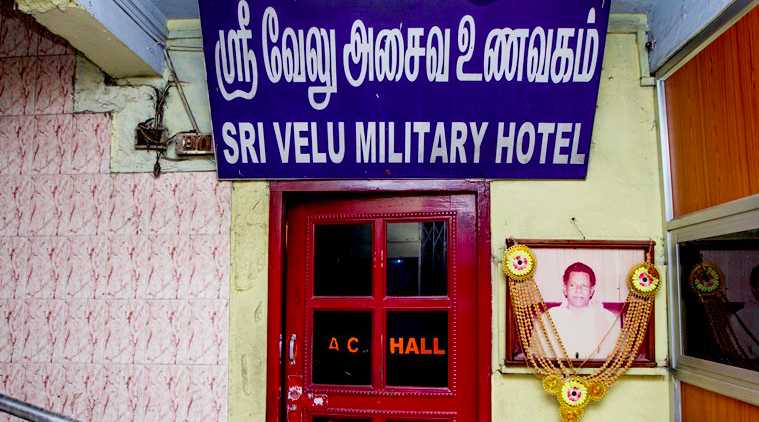Velu Ambalam set up Velu’s Military hotel, in Chennai, in 1955. Photograph by Rakesh Reddy
Velu Emblem, founder of Velu Military hotel, in Chennai, was a legend. And the cooks there will tell you this story if you are ever among them. The story goes this way: Ambalam used to live a couple of streets away from their Eldams Road eatery. But, he had to get a whiff of their signature Meen Kuzhambu (fish gravy) every single day each time as he walked towards the restaurant. If he didn’t, he would storm into the kitchen, dump the gravy cooked for the day, roll up his sleeves and make the Meen Kuzhambu from scratch. These extreme measures and leading by example have clearly paid off.
It’s been over two decades since the founder of Chennai’s most iconic ‘military hotel’ passed away, but the Meen Kuzhambu remains as flavoursome as ever. While Bengaluru’s military hotels have not shed the ‘military’ tag, in Chennai, the military suffix seems to be fading. The popular theory is that the concept of Military hotels goes back to the Second World War when quite a few of these ‘hotels’ (it’s still local parlance for ‘restaurant’ in Chennai) sprang up to cater to the large numbers of floating military personnel in the city. The name stuck and became synonymous with restaurants serving non-vegetarian food, just as ‘Udupi Hotel’ became the term for vegetarian restaurants, regardless of where the cooks themselves hailed from.
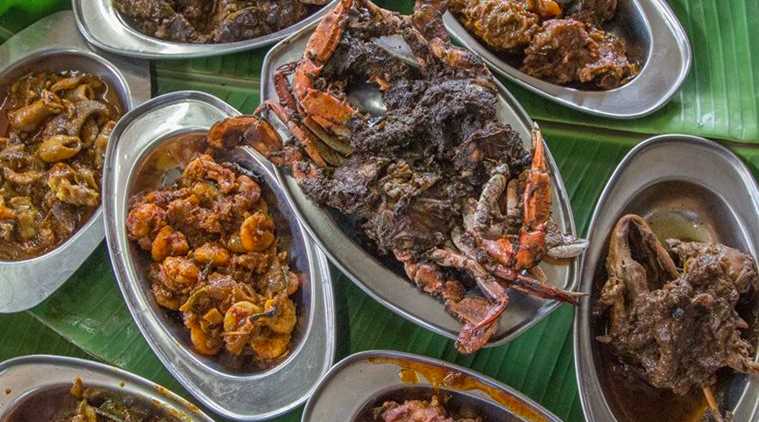
Go all out with liver fry, prawn masala or brain fry at Velu’s. Photograph by Rakesh Reddy
Velu Military hotel was certainly not the first off the blocks. Velu Ambalam moved from Melur, near Madurai, and set up the first Velu Military hotel in 1955, on Eldams Road. The staff at this restaurant proudly reminisce about how even though MGR (MG Ramachandran) and M Karunanidhi might have been on opposite sides of the political fence, they both shared a penchant for Velu’s unique brand of home-style food. One of the staff members volunteers to hunt for a framed photograph of Velu Ambalam serving MGR. He comes back a few minutes later, empty-handed. I’m not surprised; this is not a restaurant that proudly displays any accolades and it’s certainly no fine diner.
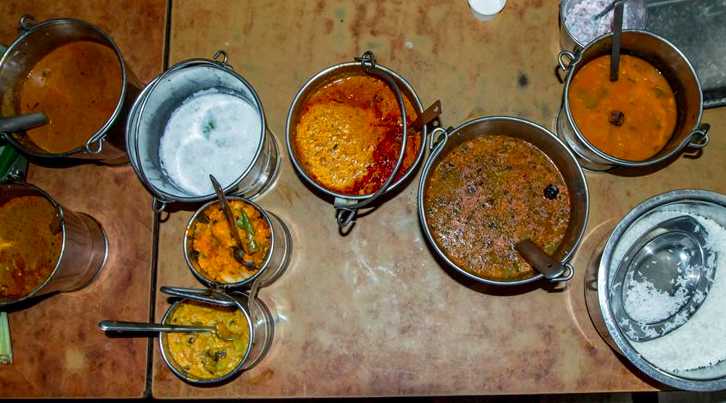
Masalas are hand-ground in traditional grinding stones at Velu’s
Military hotel. Photograph by Rakesh Reddy
There’s virtually no parking, the interiors are somewhat rundown (there’s a new floor being added, though), and yet, the restaurant continues to be a magnet for regulars and foodies seeking authentic flavours. In the 1950s and ’60s, restaurants like Velu were a haven for single men who relocated to Chennai from other cities and villages within Tamil Nadu in search of better job opportunities. For me, these flavours at Velu are similar to popular restaurants such as Chandran Mess and Amma Mess, in Madurai. Most of the ‘masalas’ are hand-ground in traditional ‘grinding stones’ (they seldom use factory-made masala powders) and most of the dishes border on fiery. Their standard meal, served on a banana leaf, includes their signature Vanjaram Meen Kuzhambu (with seer fish), a mutton gravy and a chicken curry along with the regular accompaniments. All this for just Rs 100!
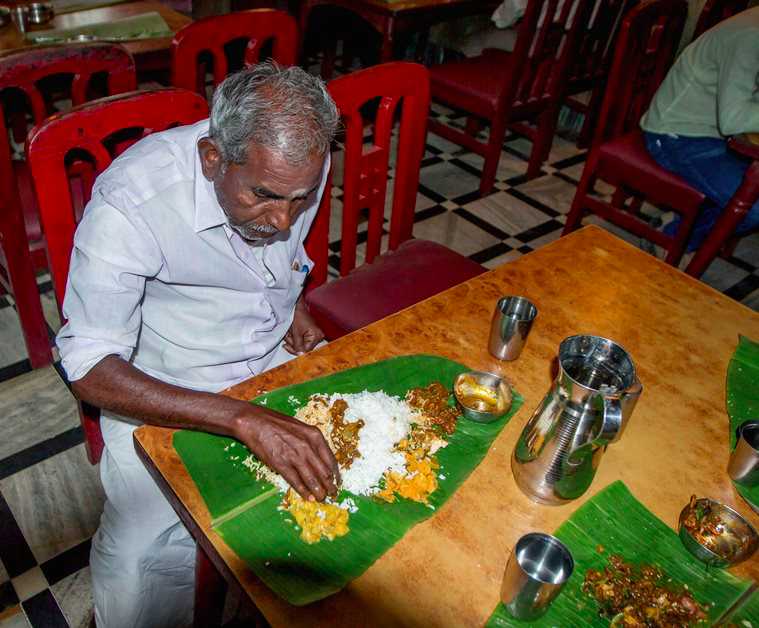
A regular meal with a number of spicy accompaniments costs
around Rs 100. Photograph by Rakesh Reddy
It’s the extras that are the true stars. From scrumptious liver fry to brain fry to a spicy prawn masala (that I can vouch for), you can keep adding extras to spice up (literally) your meal. It’s dishes like these that set Velu Military hotel apart. The restaurant is now run by Velu Ambalam’s grandson, Selvakumar, and there’s also a branch in Chennai run by another family member. Apart from occasionally catering to A-listers in the Tamil film industry, the restaurant used to ‘parcel’ large quantities of meals to film units in the past. Gajapathy, the manager at Velu, talks about Velu Ambalam’s other contemporary Anjappar, who was also one of MGR’s favourite cooks. He started a small eatery (what locals called a ‘mess’) in 1964, in the Royapettah area. While the Velu brand has chosen to retain its Military hotel tag and not move out of its comfort zone, Anjappar has branches all over the world and is positioned as a ‘Chettinad’ hotel. Traditional Nattukotai Chettiars might not be pleased, but quite a few military hotels have morphed into Chettinad hotels, since the term has become synonymous with spicy non-vegetarian food. Ponnusamy Hotel is another Chennai brand that was established around the same time (1954); it has grown into a chain from modest beginnings. Although Ponnusamy never used the Military moniker, the flavours and the menu are quite similar to Velu. From rabbit fry to quail roast, there’s enough to shock conservative taste buds. Restaurants like Ponnusamy and Anjappar also have room for their own version of Chinese cuisine on their menus. That’s not something you will find at Velu Military hotel.
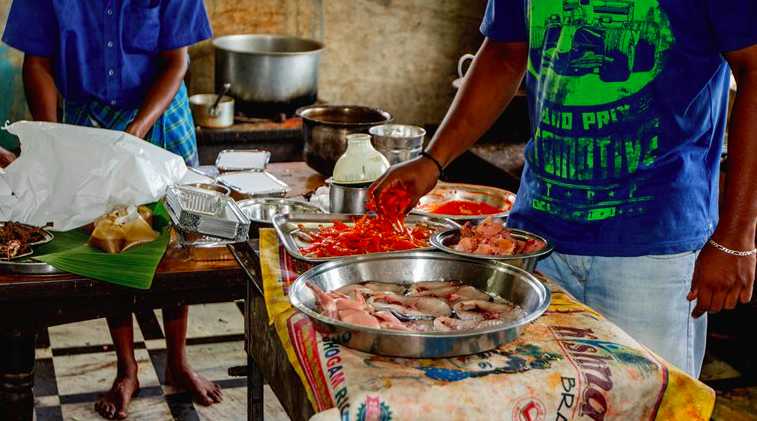
A number of military hotels were set up in Chennai and Bangalore in the early
1940s to cater to army men in both cities. Photograph by Rakesh Reddy
Military hotels are a fading phenomenon in Chennai. Quite a few of the nondescript neighbourhood military hotels have rebranded themselves as Chettinad hotels, while the non-vegetarian Tamil Nadu cuisine scene is slowly being taken over by chains such as Junior Kuppana, Anjappar and Dindigul Thalpakati Biryani. Velu is one of those rare exceptions that still takes you back to a time when military hotels were the ultimate destination for Chennai’s die-hard meat eaters

